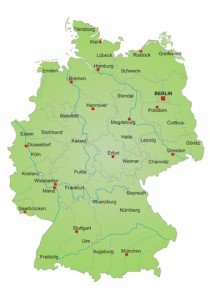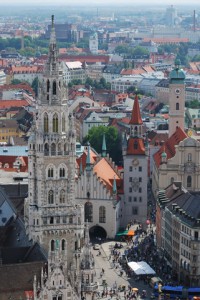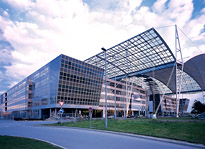
[Updated Oct 2020] A guide to serviced offices and office space to rent in Munich as well as general information that may be useful if you are thinking of renting office space in Munich.
For further offices information or to search office space for rent in Munich just click. Or contact us for any other office space query.
History & Geography
Perhaps more than any other city in Germany Munich resembles the stereotypical German city. The capital of Bavaria, located on the River Isar north of the Bavarian Alps, manages to be a well-preserved, even quaint bastion of Bavarian culture, while at the same time functioning as a modern and cosmopolitan city. Founded in 1158 among the rolling hills and lush forest of the Alpine Foreland, Munich was the site of a bridge built by Henry the Lion, Duke of Saxony and Bavaria. Two decades later Munich was fortified and granted the status of a city. Later when Bavaria was united in 1506 Munich was named the capital. During the Renaissance, the city became a centre of art and culture and expanded in size and importance. Munich continued to prosper, despite being occupied by Gustav II of Sweden during the 30 Years War and the loss of approximately one-third of its population to Bubonic Plague in 1635. When the new Kingdom of Bavaria was declared in 1806 inevitably Munich was its capital. It was in this period that many of the city’s most prominent buildings were constructed, many of which still exist to this day. After WWI the city suffered greatly from poverty and political unrest, and in the 1920s and 30s, the National Socialist Party under Adolph Hitler established their power base in the city. During WWII Munich was heavily damaged by Allied bombing but was rebuilt meticulously to its pre-war grid afterwards. Subsequently, the city started expanding again and by 1960 had over a million inhabitants. Currently, Munich is one of the most prosperous city’s in Europe and in 2010 was ranked by Monocle and the world’s most livable city. So safe is the city and so high is the quality of life that the English-speaking residents have nicknamed it ‘Toytown’.
Economy
Munich boasts both the strongest economy and the lowest unemployment rate of any German city, beating even the economic hubs of Frankfurt and Hamburg. Among the German cities of more than half a million inhabitants, the inhabitants of Munich have the highest buying power in the country. It is the economic centre of Southern Germany and the wealthiest city in the region. Among the companies headquartered in Munich are Siemens, BMW, Allianz, Munich Re, and Mann AG. Among the industries prevalent in Munich are biotechnology, software and services. Banking and financial services are also major industries in the city with HypoVereinsbank and Bayerische Landesbank both headquartered there. Munich is also the city in Germany with the most insurance companies, beating out even Frankfurt. Furthermore, the city is also a publishing powerhouse, home to the German branch of Random House, the Burda Publishing Group, and Suddeutsche Zeitung, one of Germany’s largest daily broadsheets. The broadcaster ARD and its commercial network Pro7-Sat1 Media AG also call the city home. Renowned research institute the Max Planck Society also has its headquarters in Munich. Tourism also plays a major role in the economy of the city and every year Munich is visited by approximately 1,400,000 tourists.
 Tourism
Tourism
With its beer gardens, dirndls, sausages and neo-classical and baroque architecture many view Munich as the quintessential German city. One of the city’s most famous attractions is the annual Oktoberfest (which takes place primarily in September) when for two weeks every year millions flock to the city’s beer tents to drink the beers Germany is so famous for and sample the local cuisine. Munich is best known for its Weisswurst sausages, usually eaten with sweet mustard and a baked pretzel. The area is equally well known for its Weissbier, a beer in which malted barley is replaced by malted wheat. Aside from Oktoberfest Munich has a thriving nightlife with a myriad of bars, clubs and restaurants. Kultfabrik and Optimolwerke are former industrial areas now transformed by the arrival of discos and pubs. And located in the city centre is the Hofbrauhaus, always a popular stop with tourists. However, the city also has a number of museums, the most famous of which is the Deutsches Museum, one of the oldest science museums in the world, located on a picturesque island in the River Isar. Many tourists also like to pay a visit to the Dachau concentration camp, located a mere 16 kilometres outside the city.
Transport
Munich is served by Germany’s second-largest airport, Franz Josef Strauss International Airport. It lies approximately 30 kilometres from the city and is easily reached by the local train lines. The city itself has what must be called one of the most comprehensive and efficient local transportation systems in the world. The Munich tramway has been in operation since 1876, making it the oldest operational public transportation system in the world. The S-Bahn and U-Bahn reach every part of the city and are usually punctual to the minute. Munich’s city centre has a multitude of bike paths and many of the city’s residents choose this form of transport over any other. A full 14 percent of traffic in the city is made up of bicycles. Visitors can avail themselves of the city’s bike hire system which is also fairly affordable. The city’s bus and taxi systems are cheap and also extremely efficient.
 Office space to rent in Munich
Office space to rent in Munich
The German economy has rebounded strongly after the financial crisis, mainly due to its export-driven economy and a large and efficient social safety net. In 2012 a total of 577,300 square metres of office space was leased in Munich exceeding the previous year by 13 percent. The city currently has a vacancy rate of 8.6 percent, which is the lowest of Germany’s top five office markets. The average rent in the city for Grade A office space still stands at 29.50 per square metre per month.
We carry out a free office search and our advisory and acquisition services are also free, always. Our Munich office space brokers and agents are globally regulated by the Royal Institution of Chartered Surveyors (RICS) ensuring the highest standards of commercial property advice and service at all times.

The Office Providers are Regulated by the Royal Institution of Chartered Surveyors (RICS)